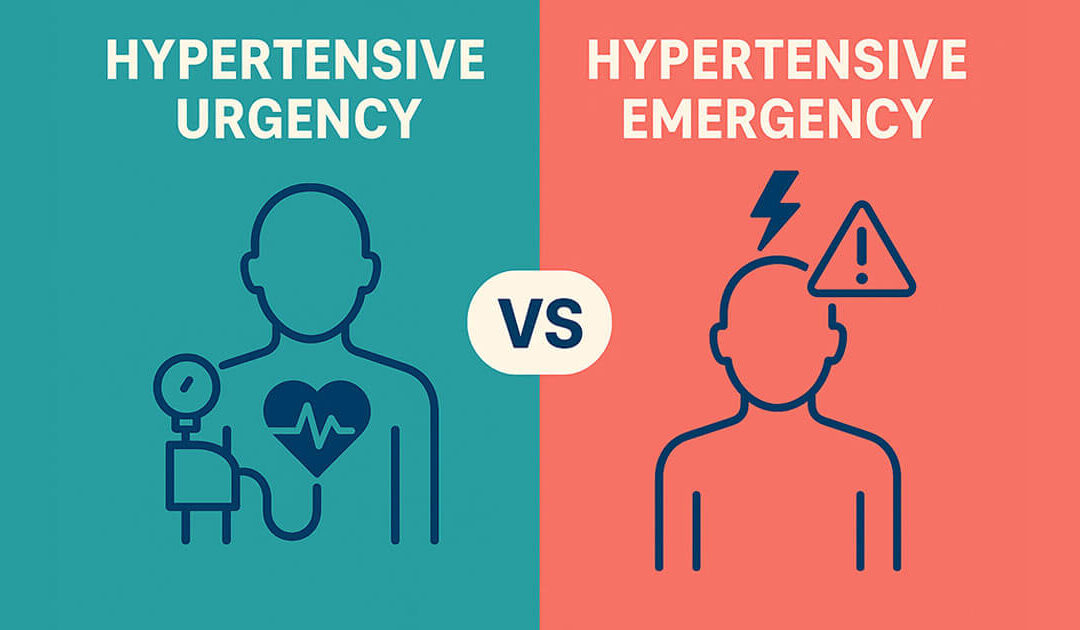High blood pressure readings can worry you. Moreover, seeing those numbers raises questions: “Is this dangerous? Do I need emergency care? Should I call my doctor now?”
These concerns feel big because your health matters to you and your family. Furthermore, knowing the difference between a concerning reading and a real medical crisis is important. However, understanding what is hypertensive urgency vs emergency gives you the facts you need.
Meanwhile, knowing when to get immediate care versus calling your doctor helps you decide what to do. In fact, this knowledge helps you respond the right way while keeping your health safe.
What Is Hypertensive Urgency?
Hypertensive urgency occurs when your blood pressure suddenly jumps to 180/120 mmHg or higher. However, the key difference lies in how your body responds. During urgency, your organs remain stable. You might feel anxious or experience a headache, but your heart, brain, and kidneys continue functioning normally.
Moreover, this condition gives you time to seek medical attention thoughtfully. Nevertheless, don’t dismiss it as harmless. Your body is sending a clear signal that something needs attention. In fact, healthcare providers at facilities like UMH understand that even urgency situations require careful evaluation and compassionate care.
Recognizing a True Hypertensive Emergency
A hypertensive emergency is different. Furthermore, this happens when high blood pressure hurts your organs. Signs include bad headaches, confusion, chest pain, or trouble breathing. Additionally, you might have vision problems, trouble speaking, or severe back pain.
Unlike urgency, hypertensive emergency treatment needs prompt action. However, knowing these warning signs helps you respond right. Meanwhile, knowing when to call emergency services protects you from serious problems.
Understanding Hypertensive Crisis: The Bigger Picture
Both urgency and emergency fall under the umbrella term “hypertensive crisis.” However, medical professionals distinguish between these conditions based on organ involvement. In fact, this distinction guides treatment decisions and determines whether you need emergency department care or can manage the situation with your primary care provider.
Moreover, recognizing the symptoms of hypertensive crisis empowers you to take swift action. However, remember that professional medical evaluation always trumps self-diagnosis. Meanwhile, having a trusted healthcare team familiar with your medical history proves invaluable during these critical moments.
When Blood Pressure Signals Heart Problems
Sometimes, high blood pressure indicates significant heart problems. Furthermore, cardiac arrest symptoms can include sudden chest pain, trouble breathing, and passing out. However, these signs are different from typical high blood pressure signs.
But, high blood pressure increases your risk of cardiac events. In fact, understanding how to lower blood pressure instantly in an emergency involves remaining calm, sitting upright, and seeking immediate medical help. Whilst don’t attempt home remedies when facing a true emergency situation.
What to Do: Your Action Plan
When your blood pressure shows 180/120 or higher, wait five minutes and check again. Moreover, if the numbers stay high but you feel okay, call your doctor right away. However, if you have symptoms like bad headache, chest pain, or confusion, call emergency services now.
Furthermore, UMH’s emergency doctors understand hypertensive urgency vs emergency well. Nevertheless, they say when you’re not sure, getting checked right away is always safest. Meanwhile, their heart doctors help with ongoing high blood pressure care and preventing future problems.
Prevention: Your Best Protection
Managing chronic high blood pressure prevents most crisis situations. Moreover, taking your medicines as told greatly cuts your risk. However, lifestyle changes also help a lot. Furthermore, checking your blood pressure regularly helps spot problems before they become emergencies.
In fact, UMH’s complete heart program uses advanced tools with personal care plans. Meanwhile, their team of heart doctors works with patients to make good prevention plans. Nevertheless, they know that managing high blood pressure needs ongoing teamwork between patients and doctors.
Building Your Care Team
Living with high blood pressure doesn’t mean living in fear because having trusted doctors by your side can make a big difference. However, education and preparation provide the foundation for confidence. Moreover, understanding the distinction between hypertensive urgency vs emergency helps you respond appropriately to concerning symptoms.
Meanwhile, UMH’s patient resources offer reliable information and support tools. They emphasize that nothing replaces personal medical care. In fact, their caring approach combines advanced medical skills with real understanding of patient concerns.
Conclusion
Knowledge is power when dealing with hypertensive urgency vs emergency situations. Listen to your body, trust your feelings, and get help when needed. Schedule a visit with UMH’s expert heart team for complete evaluation and peace of mind.

